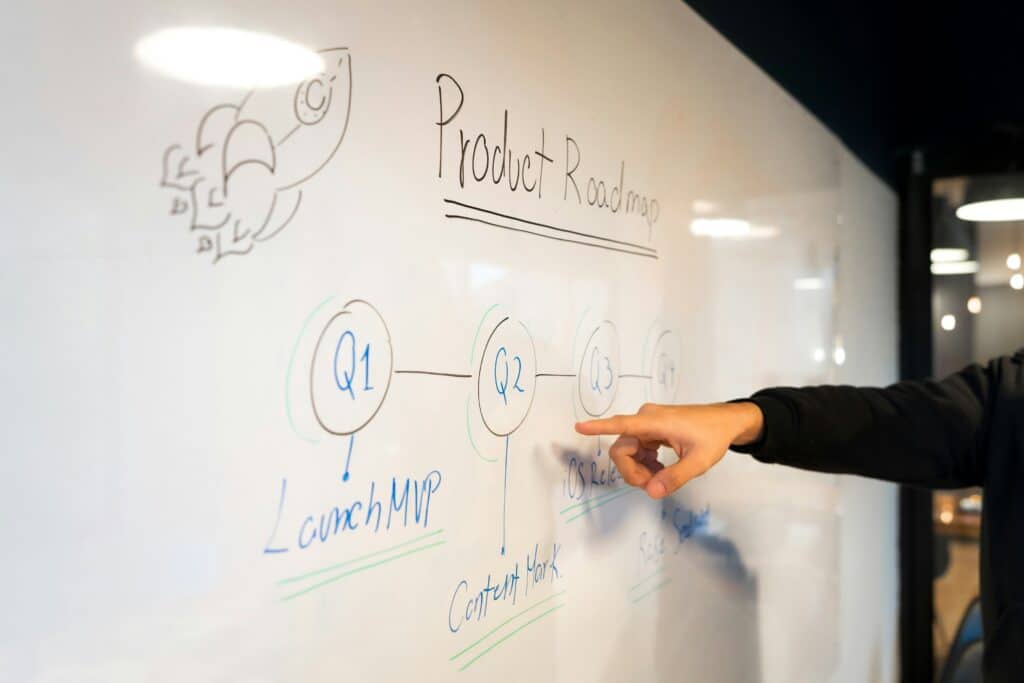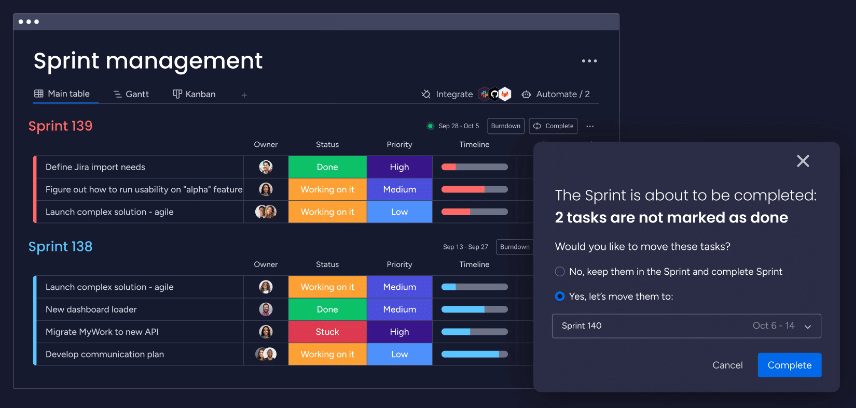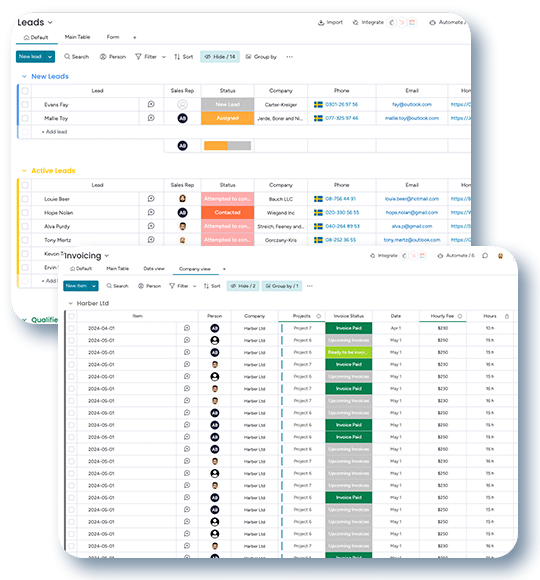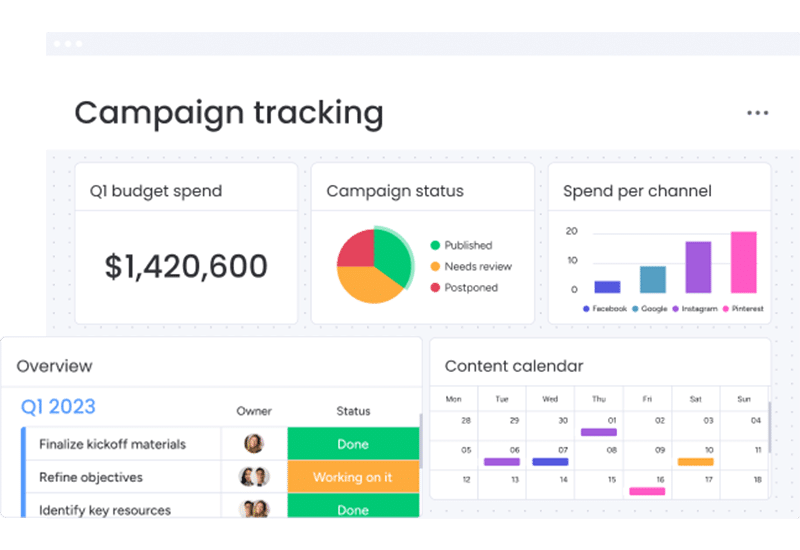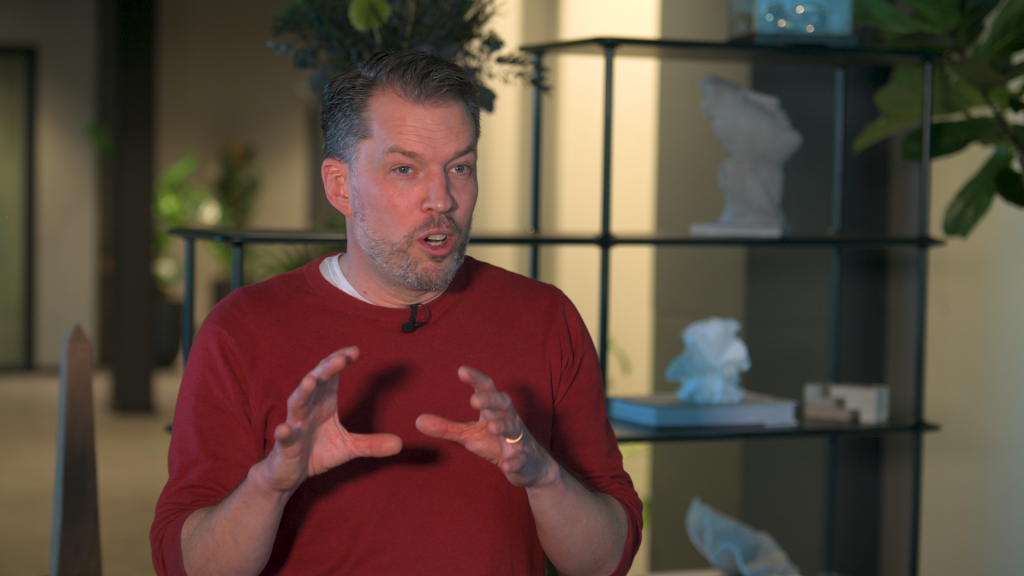Introduction
In the fast-paced business world, the ability to execute projects efficiently is not just an advantage; it’s a necessity. “Time-Saving Tools and Techniques for Efficient Project Planning” are more than just buzzwords. They are essential components in the arsenal of any successful project manager. This blog post delves into the world of efficient project planning, exploring how the right mix of tools and techniques can dramatically streamline your workflow, save time, and enhance productivity.
Whether you’re a seasoned project manager or new to the field, understanding and implementing time-saving tools and techniques for efficient project planning is critical. From leveraging cutting-edge technology to adopting proven methodologies, this post will guide you through the various ways to optimize your project planning process. We will highlight how tools like monday.com and Make, renowned for their efficacy in project management, can be game-changers in your pursuit of efficiency.
As we explore these time-saving tools and techniques for efficient project planning, remember that the ultimate goal is not just to complete projects faster but to do so with a higher degree of precision and success. Join us as we uncover the secrets to efficient project planning. Let’s set the stage for a more productive and less stressful management experience.
The Role of Technology in Project Planning
In the ever-evolving landscape of project management, the infusion of technology has been a game-changer. Embracing time-saving tools and techniques for efficient project planning is essential in leveraging these technological advancements to their fullest potential.
Revolutionizing Planning with Project Management Software
The digital era has seen a surge in sophisticated project management software. Platforms like monday.com stand out for their comprehensive features. They range from task automation to real-time collaboration, embodying the technological strides in project planning efficiency.
Harnessing AI and Machine Learning for Predictive Planning
AI and machine learning have become integral time-saving tools for efficient project planning. They offer predictive analytics and data-driven insights, a monumental leap in project planning, allowing for more accurate forecasting and decision-making.
The Impact of Cloud-Based Technologies on Collaboration and Flexibility
Cloud technology has revolutionized how we implement time-saving tools and techniques for efficient project planning. It provides much-needed flexibility and scalability in dynamic project environments. Tools like Make, for instance, enable seamless integration and automation of workflows, ensuring efficient coordination across teams.
The Future of Project Planning with Technological Integration
As we integrate these advanced technologies into our time-saving tools and techniques for efficient project planning, we not only simplify the project manager’s role but also enhance the overall efficacy and outcomes of project management.
Cloud-Based Collaboration Platforms
In the quest for time-saving tools and techniques for efficient project planning, cloud-based collaboration platforms have emerged as pivotal elements. These platforms are reshaping how teams interact, plan, and execute projects. This underscores the importance of accessibility and real-time collaboration in today’s fast-paced work environments.
Key Features and Advantages
Cloud-based platforms, exemplified by tools like monday.com, offer an array of features that align perfectly for efficient project planning. These include centralized data storage, real-time updates, and cross-functional collaboration, all accessible from anywhere in the world. This level of connectivity and accessibility is essential for modern, dynamic project environments.
Enhancing Team Collaboration and Communication
One of the core strengths of cloud-based platforms is their ability to enhance team collaboration. By allowing team members to share insights, updates, and feedback in real time, these platforms break down geographical and time barriers. In turn, this fosters a more cohesive and responsive project management approach.
Integration and Automation for Streamlined Workflows
Integration capabilities are a hallmark of effective cloud-based platforms in time-saving tools and techniques for efficient project planning. Platforms like monday.com enable the integration of various apps and tools, automating workflows and reducing manual effort. This seamless integration ensures that all project components are synchronized, leading to a more streamlined and efficient project planning process.
Scaling and Flexibility for Diverse Project Needs
Cloud-based collaboration platforms are not only about collaboration and integration; they also offer scalability and flexibility. Whether dealing with small, agile teams or large-scale enterprise projects, these platforms can adapt and scale according to the specific needs and complexities of each project.
Omnitas Newsletter
Sign up for our monthly newsletter to stay up-to-date on our latest blog articles, videos and events!
Thank you!
You have successfully joined our subscriber list.
Project Management Software
Project management software stands at the forefront of implementing time-saving tools and techniques for efficient project planning. This software category has evolved to become a cornerstone in modern project management. It offers a suite of features tailored to streamline planning and execution.
Key Features and Benefits
At the core of time-saving tools and techniques for efficient project planning is the functionality offered by project management software. Tools like Make, for example, excel in automating routine tasks, consolidating project documentation, and facilitating effective resource management. These features not only save time but also enhance the accuracy and consistency of project planning.
Automating Tasks for Increased Efficiency
Automation is a significant aspect of project management software. By automating repetitive tasks, software like Make minimizes the risk of human error and frees up valuable time for project managers and teams to focus on more strategic aspects of their projects.
Customization and Adaptability for Diverse Projects
Customization is another critical element of project management software. The ability to tailor software to the specific needs of a project or organization is invaluable. This adaptability ensures that regardless of the project’s size, complexity, or industry, the software can provide relevant and effective support.
Data-Driven Decision Making and Reporting
Data-driven decision-making facilitated by project management software is indispensable. These tools offer robust reporting and analytics features, providing project managers with insightful data to make informed decisions, track progress, and adjust strategies as needed.
Essential Techniques for Efficient Planning
While technology plays a pivotal role, mastering essential techniques is equally crucial. These techniques, ranging from prioritization strategies to effective time management, form the backbone of successful project planning and execution.
Understanding and Applying Project Planning Methodologies
Fundamental to time-saving tools and techniques for efficient project planning is a deep understanding of various project planning methodologies. Whether it’s Agile, Waterfall, or Lean, each methodology offers unique advantages that can be harnessed to streamline project planning processes. Familiarity with these approaches allows project managers to select and tailor the best methods to suit specific project needs, ensuring a more efficient and effective planning phase.
Prioritizing Tasks and Milestones
Effective prioritisation is a cornerstone technique for efficient project planning. By identifying and focusing on critical tasks and milestones, project managers can allocate resources more strategically, reducing wasted effort and ensuring that key project components are addressed promptly. Techniques like the Eisenhower Matrix or the MoSCoW method can be instrumental in achieving this prioritisation.
Time Management and Resource Allocation
Effective time management is another essential technique in time-saving tools and techniques for efficient project planning. Employing methods like time blocking or the Pomodoro Technique can significantly enhance productivity and focus. Additionally, effective resource allocation ensures that team members are assigned tasks matching their skills and availability, which is vital for maintaining a smooth and efficient project timeline.
Risk Management and Contingency Planning
Incorporating risk management is critical for anticipating and mitigating potential project setbacks. Identifying potential risks early in the planning phase and developing contingency plans can save considerable time and resources, ensuring that projects remain on track even in the face of unforeseen challenges.
Prioritization Strategies
Effective prioritization is a critical aspect of efficient project planning. It’s about making smart choices on where to focus energy and resources to maximize productivity and project outcomes.
Identifying Critical Tasks
A central component of time-saving tools and techniques for efficient project planning is the ability to identify and prioritize critical tasks. Techniques like the Eisenhower Matrix, which categorizes tasks based on urgency and importance, are invaluable in this process. By focusing on high-priority tasks, project managers can ensure that the most crucial aspects of the project are addressed first, leading to more efficient use of time and resources.
Setting Realistic Deadlines
In the context of time-saving tools and techniques for efficient project planning, setting realistic deadlines is essential. It involves assessing the scope and complexity of tasks and assigning deadlines that are achievable yet challenging. This balance ensures that the project progresses steadily without overwhelming the team.
Balancing Flexibility and Structure
Effective prioritization within project planning also requires balancing flexibility and structure. While it’s important to have a structured plan, being flexible enough to accommodate changes or unexpected challenges is crucial. This adaptability ensures that the project remains on track, even when deviations from the original plan are necessary.
Engaging Team Members in the Prioritization Process
A collaborative approach to prioritization can enhance the efficacy of time-saving tools and techniques for efficient project planning. Involving team members in the prioritization process not only leverages their expertise and insights but also fosters a sense of ownership and accountability, which can drive project success.

Time Management Techniques
Effective time management is an indispensable component of time-saving tools and techniques for efficient project planning. By mastering these techniques, project managers and their teams can optimize their work processes, ensuring that every minute counts towards the successful completion of the project.
Implementing the Pomodoro Technique
The Pomodoro Technique is a popular method with time-saving tools and techniques for efficient project planning. It involves breaking work into intervals, typically 25 minutes long, followed by short breaks. This technique helps maintain high levels of focus and productivity while preventing burnout. Implementing it can lead to more disciplined time management and improved project progress tracking.
Utilizing Time Blocking
Time blocking is another effective strategy in time-saving tools and techniques for efficient project planning. It involves allocating specific blocks of time to particular tasks or categories of work, which helps in minimizing distractions and enhancing focus. By dedicating uninterrupted time to critical project tasks, managers and teams can ensure more consistent progress and better quality of work.
Leveraging Technology for Time Tracking
Integrating technology for time tracking is a vital aspect of time-saving tools and techniques for efficient project planning. Utilizing software that tracks time spent on various tasks can provide valuable insights into how time is being utilized, identify areas for improvement, and ensure that projects stay on schedule.
Encouraging Regular Breaks and Downtime
In the pursuit of efficiency, it’s important not to overlook the role of breaks and downtime. Regular breaks are essential for maintaining mental clarity and avoiding burnout, contributing to overall project efficiency and the well-being of the team.
Integrating Tools and Techniques for Maximum Efficiency
The true power of time-saving tools and techniques for efficient project planning lies in their integration. By synergistically combining the strengths of various tools and techniques, project managers can achieve a level of efficiency that is greater than the sum of its parts.
Combining Technology with Methodology
A key strategy in integrating tools and techniques for maximum efficiency in project planning involves marrying cutting-edge technology with proven methodologies. For instance, using a tool like monday.com for Agile project management combines the flexibility of Agile with the organizational prowess of the software. This integration enhances the overall efficiency and responsiveness of the project management process.
Streamlining Communication and Collaboration
Effective integration of time-saving tools and techniques for efficient project planning also means streamlining communication and collaboration. Utilizing cloud-based platforms for real-time collaboration while applying time management techniques ensures that teams are working together effectively and efficiently, reducing delays and misunderstandings.
Automating Routine Tasks
Automation plays a critical role in the integration of time-saving tools and techniques for efficient project planning. By automating routine and repetitive tasks with tools like Make, project managers can free up time to focus on more complex and strategic aspects of the project, enhancing overall productivity.
Adapting to Project-Specific Needs
The flexibility to adapt tools and techniques to the specific needs of a project is essential in their integration for maximum efficiency. Tailoring the combination of tools and methodologies to fit the unique requirements and challenges of each project ensures that the planning process is not only efficient but also effective in achieving the desired outcomes.
Conclusion
In wrapping up our exploration of time-saving tools and techniques for efficient project planning, it’s clear that the integration of innovative software and strategic methodologies is key to driving project success. Tools like monday.com and Make have demonstrated their capacity to transform the landscape of project planning, offering flexibility, efficiency, and a high degree of customization.
If you’re ready to experience the transformative power of these tools, we invite you to try out monday.com and Make through our free trial links. These platforms are powerful, user-friendly, and suitable for all levels of project management expertise.
For those who would like guidance or assistance in getting started, our team of experts is just a call away. Book a free consultation with us below, and we’ll help you navigate these tools, tailoring them to your specific project needs and ensuring you get the most out of your experience.
Additionally, if you’ve found value in this article and wish to stay informed on similar topics, consider subscribing to our monthly newsletter below. We continuously delve into the latest trends and insights in project management, marketing, IT, and more, aiming to provide you with content that’s not just informative but also instrumental in enhancing your professional journey.
Remember, the journey to efficient project planning is continuous. With the right tools and techniques, it’s a journey that can be both rewarding and transformative. Embrace these time-saving tools and techniques for efficient project planning, and watch as your projects soar to new heights of success.
